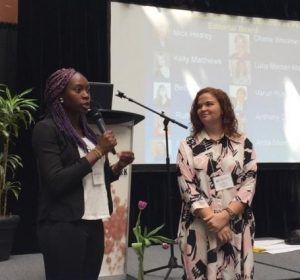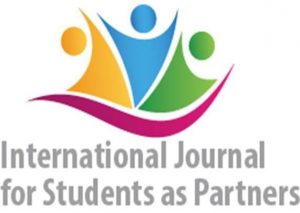Students as partners is the radical antithesis of the consumerist mind-set in higher education. Yet students have traditionally been absent from one key arena of academia: publishing. Ruth Healey, from University of Chester with co-authors Mick Healey, from University of Gloucestershire and Anthony Cliffe from Liverpool John Moores University, discuss The International Journal for Students as Partners which seeks to address this absence through pairing academic and student co-editors for all its sections.
Students as partners
“Student engagement is a great concept but it needs to be deployed to radical ends. Students as partners is not just a nice-to-have, I believe it has the potential to help bring about social and educational transformation, as long as we know what we are trying to do and we maintain a critical attitude about the ways the concept is adopted and used.” (Rachel Wenstone, Vice President (Higher Education) NUS, 2012, p. 2)
‘Students as partners’ (SaP) is the antithesis of the consumerist mind-set in higher education. Yet, ironically, the term is often misused by policy makers and institutional leaders to be synonymous with student engagement and to mean little more than collecting student views as a way of ensuring ‘customer satisfaction’. We think that this represents a hijacking of the term to support the discourse of students as consumers. SaP goes beyond simply asking students for their opinions, by inviting them to join staff in investigating, making and implementing decisions about their higher education experiences, the curriculum, and knowledge production. SaP involves “co-creating, co-producing, co-learning, co-designing, co-developing, co-researching, and co-inquiring” which involves “sharing power and an openness to new ways of working and learning together” (Healey, Flint, & Harrington, 2016, p. 9). Fundamentally, SaP involves moving towards what Brew (2006, p. xiii) memorably calls “inclusive scholarly knowledge-building communities”.
“Too many times, assumptions are made and protected, such as about who has knowledge about teaching and learning… Noticing the power dynamics that are evident in faculty and student relationships…is almost forbidden and [it’s] unheard of to challenge them. Students as Partners, however, challenges those dynamics and provides insight into what faculty may not always realize.” (Anita Ntem, IJSaP US Co-Editor and undergraduate 2017, 3)
Challenging traditional hierarchies
Students as Partners is a radical agenda because it challenges the traditional hierarchies in higher education as to who holds the power and how it is exercised. The exclusion of students from academic journal publishing prevents them from playing a full part in scholarly knowledge-building communities. The contribution of students to teaching and learning projects should be recognised (Maurer, 2017) and students should “become full participants in the design of teaching approaches, courses and curricula” (Bovill, Cook-Sather, & Felten, 2011 p. 133). Through these mechanisms Cook-Sather (2018, in press) notes, students are “adding not only their voices but their interpretative frames to scholarly practice.”
Anita Ntem (US) and Lucy Mercer-Mapstone (Australia), two of our student co-editors, launching the first issue of IJSaP at the International Students as Partners Institute at McMaster University, Canada in May 2017
The Journal
With this in mind, for the last two years we have been involved in launching and running the International Journal for Students as Partners (IJSaP) – a journal about partnership and developed and managed through partnership between academics and students. This free, open access journal, published by McMaster University Library Press, is co-edited by students and academics from Australia, Canada, UK and US. Our co-editors employ a developmental approach that recognises those new to academic publishing benefit from a partnership approach. We have co-created resources to support those student and staff reviewers who are new to the peer-reviewing process. Our International Advisory Group also includes students and staff. Through this partnership approach we are thinking differently about engaging in the process of academic publishing, while contributing high quality publications on engaging students as partners to advance research and practice on an international scale.
Lucy Mercer-Mapstone (IJSaP Australian co-editor and PhD student, 2017, 5) emphasised the excitement she felt “learning about working in partnership with new people in a new context; … the intricacies of journal production, editing, and peer review; [and about]… collaboration on an international scale.”
As one of the authors of this blog post and IJSaP co-editor, Anthony Cliffe reflects: “Having the opportunity to work as a co-editor really empowered me as a student, I feel like I’m valued. As a student, I can offer different insights and raise questions from my perspective that an established academic may not think of. Being involved in this venture has not only been rewarding personally, I believe my academic colleagues have also benefitted.”
Toward an inclusive scholarly knowledge-building community
If we want to genuinely move toward universities as egalitarian learning communities (Matthews, Cook-Sather & Healey, 2018), then it is time to open the doors of academic publishing so that students and staff work together on both the process and products of academic publishing. Guided by the principles and values underpinning students as partners (Higher Education Academy, 2015; Matthews, 2017), IJSaP has shown that students and academics can work together in academic publishing to enhance not only the quality of the outputs but also to develop students and academics in an inclusive scholarly knowledge-building community. This practice has steered us toward mutual respect and shared ownership for the journal.
The radical work of IJSaP continues because we are dedicated to offering a journal on students as partners that is co-created through partnership. We invite you to be a part of IJSaP by contributing to the conversation on teaching and learning partnerships in higher education.
Ruth L. Healey
Mick Healey
Anthony Cliffe
About the authors
Ruth Healey is a Senior Lecturer at University of Chester and a director of Healey HE Consultants. She is an inaugural co-editor of IJSaP.
Mick Healey is a higher education consultant and researcher and emeritus professor at University of Gloucestershire. He is the inaugural senior editor of IJSaP.
Anthony Cliffe is a PhD researcher and graduate teaching assistant, Liverpool John Moores University (BSc and MSc University of Chester). He is an inaugural co-editor of IJSaP.
Acknowledgements
We would like to thank Alison Cook-Sather (Bryn Mawr, US) and Kelly Matthews (Queensland, Australia), co-editors IJSaP, for their helpful comments on an earlier draft of this blog post.













